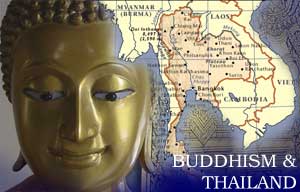Generate light, not heat
by PHRA PAISAN VISALO, The Bangkok Post, May 23, 2008
Bangkok, Thailand -- In today's Thailand, anger and hatred are spreading like a gas leak in a closed room. With a spark, often in the form of political debate, this latent pressure can explode into a conflagration.
 Extreme polarisation is generating extreme heat in this country, tearing society apart. Each opposing side is flinging aggressive tirades at the other. The crudity and rudeness, usually looked down upon when things were more orderly, are more the norm these days. Each camp competes with the other in a game of discrediting.
Extreme polarisation is generating extreme heat in this country, tearing society apart. Each opposing side is flinging aggressive tirades at the other. The crudity and rudeness, usually looked down upon when things were more orderly, are more the norm these days. Each camp competes with the other in a game of discrediting.
One obvious result of this race to extremes is the fast disappearance of moderates. People who are neither with one or the other side find no room for their opinions in this us-versus-them melee.
The making of an enemy is a tactic being used, smearing the other side as being corrupt and contemptible beyond redemption, that the other side appears to be the source of all the evils befalling the country. It is not just hatred that these power groups are instigating. Look deeply. What they are inciting is fear.
Fear is a handy tool for politicians. Those who employ the tactic of fear, reviving the ghost of Communism or brandishing the terrorist threat, often reap a large number of votes. Fear can compel people to prompt action, even to sacrifice certain types of freedom, to get away from it or to quell it.
Do not underestimate the power of fear. Some 30 years ago, the fear of Communism was used to rouse a group of people to the extent that they went on a rampage, butchering students and members of the public at Thammasat University.
Fear is what is gripping the country right now. We are not only afraid that the economy will go downhill and cause another round of hardship, we are also being made to worry that the monarchy is under threat. We are told to be alarmed that Buddhism is being sabotaged and that irresponsible globalised capital is destroying our sense of nation.
The sum of all fears, of course, is in the accusation that whoever is on the opposite side is not loyal to the throne. Each side diligently produces new discourses and evidence to prove the treachery of the other group.
This instigation also reflects the profound fear in the hearts of the leaders of each interest group. They have to do everything to bring down people they perceive as their enemies, or they face ruin themselves.
Where will this politics of fear lead us to?
The thing is, the complexity of the country's problems has now been reduced to a simplistic personal feud. The answer then boils down to a choice of: either you are with former prime minister Thaksin Shinawatra, or against him.
While conflict is not necessarily a bad thing - it is a natural part of human society - it should not be allowed to escalate into a hostile confrontation with the aim of annihilating the opposite side. When such a war-like confrontation happens, violence will ensue and the country will be plunged into crisis.
During times of political frenzy such as now, the public must gather its senses, remain calm and focused on doing the right thing. The public must be firm in endorsing the path of non-violence and urge all sides to stop the mud-slinging and making a monster of their opponents.
Also, the public must try hard to bring into discussion a third alternative whenever there is a confrontation and only two extreme options are proposed. The presence of an alternative is crucial in a stand-off situation like this. It will provide some breathing room and space for the silent majority, who may not agree with the extreme options but have no opportunity to speak up.
One topic of extreme contention at present is definitely the constitution amendment. At this point, it seems only two options are available to the public: either to hold onto the 2007 charter without any changes, or to accept whatever the majority MPs in Parliament would rather have. Both these options can only lead to more confrontation, as it is clear neither is acceptable to the groups that are facing off one other.
A third option is urgently needed on this matter. The public must be engaged in order to break this impasse. The question is less about what alternative options are available, than who will be able to present it in a convincing manner and whether they can disperse the prevalent animosity in the current atmosphere and reach out to the dormant, reasonable masses.
------------------
Phra Paisan Visalo is a Thai monk and founder of Thailand's Buddhika network for engaged Buddhism.

 Extreme polarisation is generating extreme heat in this country, tearing society apart. Each opposing side is flinging aggressive tirades at the other. The crudity and rudeness, usually looked down upon when things were more orderly, are more the norm these days. Each camp competes with the other in a game of discrediting.
Extreme polarisation is generating extreme heat in this country, tearing society apart. Each opposing side is flinging aggressive tirades at the other. The crudity and rudeness, usually looked down upon when things were more orderly, are more the norm these days. Each camp competes with the other in a game of discrediting.